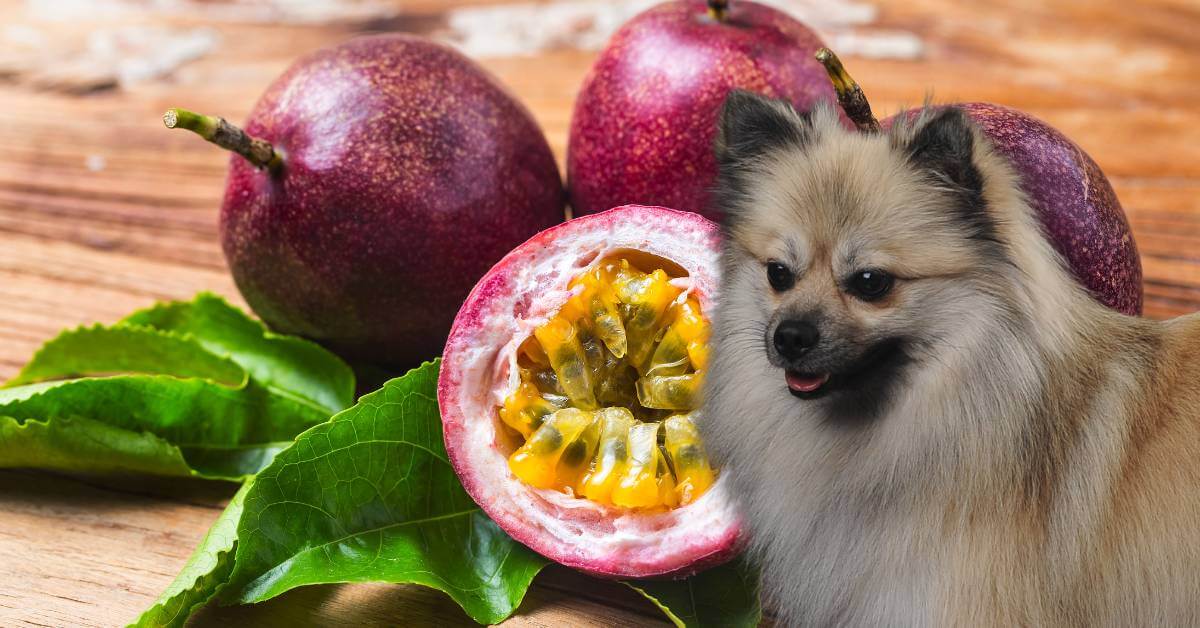Can Dogs Eat Passion Fruit?
Dogs shouldn’t eat passion fruit as it’s high in sugar and fiber, and because passion fruit seeds contain cyanide. But, if your dog accidentally eats passion fruit, they are most likely going to be fine. Unlike people, dogs can’t easily crush or chew the seeds to release the cyanide, so the risk of poisoning is extremely low. Still, that doesn’t mean you should give your dog passion fruit when there’s other healthier fruit out there!

Cyanide poisoning from passion fruit is super rare. Other fruits like cherries and apples also have cyanide in their pits and seeds, but again, dogs would really need to chew the seeds to release the cyanide and eat quite a lot, which rarely happens.
Is passion fruit good for dogs?
No, passion fruit isn’t good for dogs. While it does have vitamins and healthy fiber, it’s high in sugar and can easily cause digestive issues like diarrhea.
Again, while cyanide poisoning is very rare, as your dog will swallow the passion fruit seeds whole and pass them without chewing and crushing, there’s no need to take that risk since the benefits are minimal to none.
Some other fruits that have cyanide but are not dangerous are cherries, apples, and peaches. These contain a different form of cyanide called amygdalin.
Passion fruit, on the other hand, contains cyanogenic glycosides, not amygdalin. In passion fruit, the cyanogenic glycosides are compounds like passiflorine, found in the seeds and rind. These glycosides can release hydrogen cyanide (HCN) when metabolized. However, the risk of cyanide poisoning from passion fruit is low for most animals, including dogs, because:
While the risk is minimal, the benefits are none, so there’s no reason to give your dog passion fruit.
Don’t give your dog passion fruit
It’s really best that you don’t give your dog passion fruit. As I mentioned before, passion fruit contains cyanide in both its rind and seeds, which makes it unsafe for dogs.
With fruits like plums or nectarines, you can simply remove the pits and give your dog the actual fruit that’s safe. But with passion fruit, anyone who’s eaten it knows that removing the seeds isn’t possible—you’d be left with almost nothing to give.
Most of the seeds in passion fruit will pass harmlessly through your dog’s digestive system without releasing cyanide. However, the risk, while small, still exists, so it’s better to avoid giving your dog passion fruit altogether.
If you’re looking for tropical fruits that are safe for dogs, try these instead:
- Bananas
- Mangoes (with the pit removed)
- Pineapple (in small, peeled pieces)
- Papaya (without seeds)
- Coconut (unsweetened and fresh)
Are there any reported cases of passion fruit poisoning in dogs?
I haven’t found a single reported case of passion fruit poisoning in dogs! That doesn’t mean I would ever take the risk and give my dog passion fruit, and neither should you.
Have you ever heard about such a case? Let us know in the comments!
Love, life, and fur forever!
FAQs
Can dogs eat passion fruit seeds?
No, dogs shouldn’t eat passion fruit seeds. The seeds contain toxic compounds that can release cyanide when chewed. While the risk is low because dogs typically swallow the seeds whole, it’s better to avoid giving them passion fruit altogether.
What should I do if my dog eats passion fruit?
If your dog eats a small amount of passion fruit, they’ll likely be fine. Watch them for any signs of stomach issues, including vomiting or diarrhea. If they eat a large amount or show unusual symptoms, call your vet immediately.